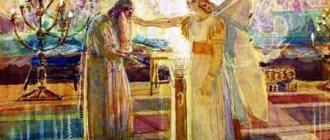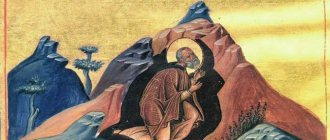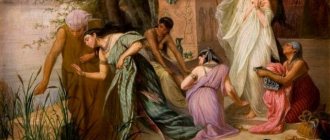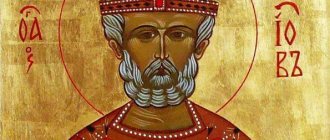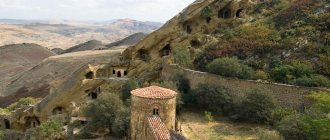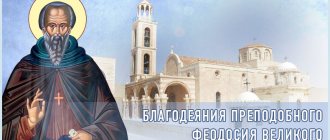The Holy Prophet Jeremiah is considered the Old Testament forerunner of Christ, possessing the gift from above to foresee and proclaim future events. And the Lord told him many things about the future, in particular the saint described the division of the Bible (Holy Scripture) into two books: the Old and New Testaments.
The prophet Jeremiah is one of the four main prophets who are revered by the Orthodox and Catholic canons. What does the saint's name mean? Translated from ancient Hebrew, the name Jeremiah means “The Lord will exalt.” His name is iconic among believers as the greatest saint who showed all the courage and zeal to turn his people away from death and expulsion from their native land.
Omens for Jerusalem
The prophet Jeremiah lived in difficult times. His biography will be told to the reader in the article.
The omens said that all the tribes of the northern kingdoms would march on Jerusalem, placing their thrones at the entrance to the city, as well as around its walls. The majestic city collapsed due to the unbelief of the inhabitants, who turned away from worshiping God. Jeremiah tried to hold off the impending tragedy. He spent time non-stop in prayers to God, crying out to him for the forgiveness of his beloved people, and watering the land, which was awaiting a bloody fate, with bitter tears.
The prophet wandered the streets of his hometown, stopping rich and poor in order to turn at least one person away from sinful actions. Jeremiah could equally fearlessly enter a royal mansion or a pottery workshop to proclaim the will of Yahweh. His love for his city and people did not find a response in the hearts of his fellow citizens; he was considered an outcast and a traitor, a traitor and a spy. He decided to share the fate of his exiled people rather than remain in the care of the pagans. And at the very end, he fell defeated under the blows of his people, whom he had served all his life. This was a great man and prophet of God - the holy righteous Jeremiah.
Contents of the Book of Jeremiah
Jeremiah was deeply versed in historical and liturgical literature - the book of Jeremiah is replete with quotations from the Torah and Tehillim, and especially from the works of the prophets who preceded him. Already in his early sermons, Jeremiah mercilessly denounces the Jews for their apostasy from the Covenant. Demanding that all thoughts and efforts be concentrated on moral improvement, on the implementation of social justice and true justice, he foreshadows for Judah the fate that befell the kingdom of Israel: complete destruction by “the people who will come from the north.”
Jeremiah considers himself called by God to “uproot and destroy, destroy and destroy,” and only then again “to build and plant” (Jer. 1:10, 14–15). The severity of his prophecies, the terrifying pictures of destruction, disaster and famine prepared for Judea, arouse the hatred of those around him even in his hometown. In deeply personal poetic “confession”, Jeremiah bitterly complains about loneliness and doom to be a man all his life, “who argues and quarrels with all the earth” (Jeremiah 15:10), but does not consider himself entitled to renounce the mission entrusted to him by God.
Biographical information
When did the prophet Jeremiah live? His life dates back to 650 BC. The prophet Jeremiah was born into the family of the priest Hilkiah in the city of Anathoth near Jerusalem in the 13th year of the reign of King Josiah of Judah. The symbol of Jeremiah's messages was the image of his own life: hopelessness, melancholy, the inevitability of God's punishment for his sins. The prophet survived seven kings of Judah, although his ministry was greatest during the reigns of kings Joash, Jehoiakim, Jehoiachin and Zedekiah.
The prophetic gift was revealed to him completely unexpectedly at a young age. And Jeremiah was only 15 years old when the Lord appeared to him and touched his lips, promising his protection and help. The young man was frightened and refused the difficult mission, but he had to humbly accept his fate, which had been predetermined for him since birth. The first revelation from the Lord was that kingdoms would appear one after another and just as quickly perish.
This prophecy began the difficult fate of Jeremiah, who would later be called the “weeping prophet.” To depict sorrowful lamentations and complaints, the term “jeremiad” was coined. He could not achieve success in the field of preaching, so he bitterly cried out to Yahweh that the task at hand was too difficult for him, and everyone was laughing at him and mocking his speeches.
At the very beginning of his activities, Jeremiah took the side of King Josiah, who wanted to restore the cult of worship of Yahweh. He abandoned omens for a while, because he considered his mission useless. Although over time he realized that only he could save the people of Israel from a tragic fate that threatened expulsion and ignominy.
Jeremiah in art
Jeremiah consoles his foremother Rachel.
Engraving by I. Budko. The personality of Jeremiah has been the theme of many works of art and literature from the Renaissance to the present day. Frescoes and sculptures in many European cathedrals are dedicated to Jeremiah (Donatello's sculptures in the Florentine bell tower, Michelangelo's fresco in the Sistine Chapel and others).
In Jewish art, L. Uri’s painting “Jeremiah” deserves special attention. In literature, the drama of S. Zweig, the novels of F. Werfel and J. Dobrachinsky (in Polish), and the poems of D. Merezhkovsky and S. Frug are dedicated to Jeremiah in Russian. In Hebrew literature, Jeremiah is the main character in M. Z. Volfovsky’s novel “Beit Ha-Rechavim” (“House of the Rechavites”, 1962).
How does the icon depict the saint?
The Prophet Jeremiah on the icons is depicted not as a white-bearded old man, but as a middle-aged man. He has a powerful physique, dark hair, and a short round beard that emphasizes the correct proportions of his face. The right palm is folded, and the left palm contains a scroll. In the scrolls you can read the words of the prophet Baruch, who was the scribe and friend of the prophet. It was Baruch who was engaged in recording the omens of the prophet when he was in prison. When compared with other prophets (Isaiah, Ezekiel and Malachi), he gives the impression of a mighty warrior with a purposeful look, who had to go through a number of tests and not break under the blows of fate.
Mission: Declaration of Disaster
Jeremiah had a difficult mission all his life, because he had to inherit his father’s work, serve in the temple, get married and raise children. But the Lord predestined for him a different service, meaning renunciation of himself, of his desires, of life in comfortable conditions. The most difficult sacrifice for Jeremiah was to predict disasters for his native people. Instead of words about joy and bliss, he was forced to prophesy about destruction, slavery and death. The Lord called him to preach in Jerusalem so that people would turn their eyes to the true God.
The Old Testament prophet tried to convey messages to people everywhere, so he preached wherever he had the slightest opportunity. And they saw the prophet weeping at the city gates, and in the temple, and in the valley of the sons of Hinnom, and in prison. He had a secretary, Baruch, who recorded sermons and revelations and then sent them in writing to the elders of Judah.
Jeremiah's sermons did not find a response in the hearts of people, although they came true with alarming speed. The people did not want to listen to the tragic news; the saint was even called a traitor to the faith. The priest Paschor decided to deal with the prophet: he hit him and imprisoned him in a block to stop talking about the plight of the people of Israel.
What are Jeremiah's predictions about?
The main idea of Jeremiah's predictions was submission to the new state of Babylonia, which was rapidly growing and gaining military strength. The saint suggested that the rulers and noble citizens abandon Egypt so as not to bring terrible punishments on Judea. Nobody wanted to heed his words. They whispered that he was actually a Babylonian spy and was trying to cause trouble. At that time, Egypt was the strongest state, and Babylonia was just beginning to develop, so no one saw any danger from it. Jeremiah's speeches irritated his fellow tribesmen and turned them against him.
A terrible prophecy
Many biblical prophets appealed to the people to submit to God, so as not to incur heavenly punishment. Jeremiah was not the first saint in this field. Joachim appears on the throne of Judea after Johal, who vowed eternal cooperation with Egypt. During the reign of this king, dark times came for the prophet. The saint visits Jerusalem, where he preaches that if people do not immediately return to God’s commandments and humble themselves by turning their gaze to Babylonia, then strangers will appear in the city, and the entire population will be in slavery for 70 years.
The Old Testament prophet speaks of inevitable grief - the destruction of the Jerusalem Temple, the main Jewish shrine. Among the priests, such words caused a murmur of discontent. He was captured and brought to trial by the nobility and people, who demanded immediate execution. Jeremiah managed to escape. Soon he would be taken to execution, but in difficult times his friend Ahikam and other princes helped him out.
The book of prophecies and the king
Some time after these unpleasant events, Jeremiah's disciple Baruch collected all the prophecies he had made in one book and read them before the people in the vestibule of the Jerusalem Temple. Having heard about this, King Joachim wished to personally familiarize himself with these records. After he read them, terrible anger fell on the prophet’s head. Court eyewitnesses said that the ruler himself cut off pieces from the scroll with records of Jeremiah's predictions and burned them in the fire of the brazier standing in front of him until he completely destroyed the book.
After this, the life of the prophet Jeremiah became especially difficult. He and his disciple Baruch had to hide from the wrath of Joachim in a secret refuge. However, here the saints did not waste time and recreated the lost book, adding other prophecies to it.
Prophecies come true
Despite constant hardships and humiliation, the prophet felt that his words were needed by the people. Power in Assyria was gradually weakening, but it was too early to feel calm in the face of the threat of invasion by other states. Politicians considered Babylon a frivolous adversary and sought support in Egypt and later in Assyria.
The Egyptian rulers decided to pit the two states against each other: they invited Judah to oppose Nebuchadnezzar and stop paying tribute to him. This was the beginning of the punitive operation of the Babylonian king, who assembled a huge army designed to wipe out the rebellious Jews from the face of the earth. All these events were predicted by Jeremiah: a bloody war and the destruction of his native country. At that time, it was not entirely correct to consider this a prophecy; all previous events did not predict a good outcome under the reign of short-sighted kings. It was obvious to any citizen that refusal to pay tribute to Babylon would entail bloody retribution.
The Prophet Jeremiah criticized the conclusion of political alliances and condemned the decision to refuse to pay tribute. He spoke of imminent punishment, the fall of Jerusalem and the destruction of the temples. For this he was accused of apostasy and treason. After all, Yahweh promised protection for his people, but the prophet doubts God’s words. Jeremiah did not calm down, he decided to write a message to King Joachim. A menacing message was read to the ruler, but he tore it up and burned it. Jeremiah writes another message together with his assistant Baruch, filling the scroll with new prophecies and threats.
Fall of Judea
The destruction of the scroll with unpleasant predictions for the unrighteous king Joachim, who spent all his time in unbridled amusements, did not help. In 605 BC. e. At the Battle of Carchemish, the young Babylonian ruler Nebuchadnezzar inflicted a crushing defeat on the Egyptian troops. The Jews, who did not listen to the words of Jeremiah, of course, participated in this battle as vassals of Necho the Second.
When Nebuchadnezzar approached the walls of Jerusalem, King Joachim had to pay him off with part of the temple treasures and give the sons of many noble people of Judea as hostages. After the Babylonians left, the unrighteous ruler continued his carefree life.
In 601 BC. e. Nebuchadnezzar launched another campaign against Egypt. However, Necho the Second managed to repel him this time. King Joachim of Judea took advantage of this to finally break with Babylonia. The offended Nebuchadnezzar, who by that time had already subjugated Ammon and Moab, moved towards Jerusalem. In 598 BC. e. the city was taken by him, its ruler was killed, and the temple was destroyed. Jeremiah's prophecy came true. As he predicted, the Jews taken to Babylonia subsequently spent 70 years in captivity.
Jeremiah is a prophet who, as already mentioned, lived just a few kilometers from the walls of Jerusalem and for many years had the opportunity to admire its majestic outlines. The pictures of the destroyed city and temple struck him deeply. The prophet expressed all his pain and sadness in a special poetic text. The latter is officially included in the Bible and is called “The Lamentations of Jeremiah.”
Jeremiah's hardships: punishment for prophecies
Even those closest to him refused to be related to him, and his neighbors plotted to kill him. The people twice demanded that the authorities execute him. Among the ancient Jews, he pronounced prophecies for 23 years, during which time he exposed their sins, apostasy from the true God, and predicted misfortunes and grief. Everyone avoided him, subjected him to ridicule and persecution. Jeremiah decided to demonstrate the words literally; he wanted to tell about the irreversibility of the conquest by the Babylonian kingdom. His actions were full of symbolism, but they emphasized the wrong direction of the kings' policy and the onset of a terrible catastrophe.
Yahweh commanded him to take an earthenware jar and break it. Thousands of fragments scattered to the sides, which testified to the fragmentation of the Israeli people throughout the world. The next time, the prophet received instructions from God to take a linen belt and take it to the Euphrates River to hide it in the crevices of the rock. Over time, the belt completely rotted, which predicted a similar fate for the Jews. Jeremiah puts a wooden yoke around his neck and appears before King Zedekiah to emphasize the slave future of his compatriots. The servants remove the yoke from the prophet's neck, but he does not calm down - he puts on the iron yoke and again appears to the king.
To whom does the prophet Jeremiah compare the Jewish people?
Jeremiah's predictions are thus largely related to the political events that took place during his lifetime. However, much attention was paid to the moral side in his sermons and instructions. The Prophet sincerely believed that it was possible to avoid future misfortunes only by repenting and submitting to the will of God.
He likens the Jewish people to an apostate who does not know what he is doing. Jeremiah compares all the ancestors of the Jews of that time who abandoned the faith to a bundle of firewood, which will flare up and burn from just the word of God.
The prophet, in spite of everything, assigns a special role to the Jewish people as God's chosen ones. However, at the same time, he compares it not only with a bundle of firewood, ready to catch fire, but also with a clay pot. This is evidenced by a significant incident that happened to the prophet. One day, walking through the streets of Jerusalem, he approached a potter, took one of the pots from him and smashed it on the ground, prophesying the imminent death of Judea and comparing it with this fragile vessel.
The plight of the prophet
To stop him from prophesying, they throw him into prison, and later they try to drown him in the mud of a fortress moat. Now it is impossible to judge whether the prophecy came true or the rulers conducted incorrect negotiations, but difficult times have come for Judea. The Babylonians actually went to war against Jeremiah's homeland. The army of the Babylonian king Nebuchadnezzar swept away the kingdom of Judah, conquered the local inhabitants and drove them into slavery. Nebuchadnezzar himself showed pity for Jeremiah, released him from prison and gave him personal permission to preach wherever the saint wished.
During the siege of Jerusalem, the prophet spoke with sadness about the coming judgment of Yahweh. He also said that this is not the end, bright times will come when God will give blessings to the people of Israel. At that time of grace, all laws will be written not on tablets, but in the hearts of believers.
The Jewish administration decided to throw off the oppression of the Babylonians, followed by a riot and an attempt to hide with an ally, that is, with the Pharaoh of Egypt. By that time, the prophet had managed to write the famous work “Lamentations of Jeremiah” - a work in verse that describes the fate of the Jewish people and the destruction of the majestic Jerusalem. He managed to hide the Ark of the Covenant and the Tablets in a hiding place so that they would not be torn apart by enemies. The Jews fled, but took Jeremiah with them, although he tirelessly predicted punishment on the heads of the Egyptians.
PORTAL CONTACTS
And the word of the Lord came to me: Before I formed you in the womb, I knew you, and before you came out of the womb, I sanctified you: I made you a prophet to the nations. And I said: Oh, Lord God! I don’t know how to speak, because I’m still young. But the Lord told me: do not say: “I am young”; For to everyone to whom I send you you will go, and whatever I command you you will say. Don't be afraid of them; For I am with you to deliver you, said the Lord. And the Lord stretched out His hand and touched my mouth, and the Lord said to me: Behold, I have put My words in your mouth (Jer. 1:4-9).
The Prophet Jeremiah (Irmiyahu) lived twenty-seven centuries ago, but we still hear the sound of thunder in his name to this day. And if we open the Old Testament and find the book of Jeremiah in the corpus of prophetic books, we will become witnesses to a terrible human drama. And let us understand that this drama is strikingly modern; that the pain of the ancient prophet is the pain of our nerves. The closer the Last Judgment, the more audible the voice of Jeremiah.
The book of the prophet Jeremiah is incredibly poetic, rich in colors, images, symbols; at the same time, it gives a vivid idea of the life of that time, way of life, customs, and objects that people used; so it's interesting to read.
We talk about the book of the prophet Jeremiah with Alexei Kashkin, a biblical scholar, head of the department of biblical studies at SPDS, author of the textbook “The Holy Scriptures of the Old Testament.”
— Alexey Sergeevich, before talking about Jeremiah, let’s talk about who prophets are in general;
that there is a prophetic tradition in Jewish religious culture (after all, we find the concept of “prophesying” in the New Testament too); how a person became a prophet, how the prophets received their knowledge, why the Creed says about the Holy Spirit that He speaks through the prophets. — The common idea of a prophet—one who somehow recognizes and predicts the future—is, to put it mildly, erroneous in relation to the Old Testament prophets. In the Old Testament, a prophet is, first of all, a messenger of the will of God, a mediator between God and people. He proclaims to people God's will regarding the past, present, and future. Announcing the future is not an end in itself and not the main thing. If we take all the prophetic books of the Old Testament, we will see that prophecies about the future occupy a relatively small place in them. The best illustration explaining who a prophet is can be considered the place in the book of Exodus ( 7 :1), where God Himself tells Moses that he will be a god for Pharaoh, and Aaron will be his, Moses, prophet. A prophet - that is, an exponent of the will. The prophet explains to the people the hidden reasons for current events and points out the consequences of the decisions that people make in the present. He comments on what is happening in the categories of the Law and truth of God. One should not identify prophets with fortune-tellers and soothsayers, of whom there have always been many. The prophet does not have such a task - to amaze everyone by accurately predicting the future. He has a different task - the correction of people, the triumph of God's truth on earth. Here is an example: the prediction of the prophet Jonah about the destruction of Nineveh is not fulfilled (see: Jonah 2 , 10). If we viewed Jonah solely as a prophet, we would see this as his failure. But this was not the meaning of his mission, but to ensure that Nineveh was saved.
- The prophet does not speak for himself. Most chapters of the book of Jeremiah begin with “Thus said the Lord...”, or “The word that came to Jeremiah from the Lord...”, or “Hear the word that the Lord speaks to you...”
“The Lord speaks through the mouth of a prophet, and this is very clearly expressed in those verses of the prophetic books that talk about the calling of prophets to serve. Book of the prophet Isaiah: And I heard the voice of the Lord saying: whom shall I send? and who will go for Us? And I said: here I am, send me. And He said: go and tell this people... ( 6 , 8-9). The book of the prophet Jeremiah: the same calling of the prophet by the Lord is reported in the first chapter. The book of the prophet Ezekiel - a Babylonian captive, an immigrant - begins with a miraculous vision and the words of the Lord to the prophet: son of man! I am sending you to the children of Israel, to a rebellious people who rebelled against Me; They and their fathers have been traitors to Me to this very day. <...> I am sending you to them, and you will say to them: “Thus says the Lord God!” Will they listen or will they not, for they are a rebellious house; but let them know that there was a prophet among them ( 2 , 3–5). Please note that in all these texts the Lord sends a prophet to speak to people, so that the prophet will convey His will to the people; and promises the prophet His protection and help, thus freeing him from fear. In the Nicene-Constantinopolitan Creed, which we all sing together at every Divine Liturgy, there are words that we believe “...And in the Holy Spirit, the Lord, the Life-Giving <...> who spoke the prophets,” that is, speaking through the prophets. This part of the Creed is based on the Holy Scriptures of the New Testament. The Epistle of the Apostle Paul to the Hebrews begins with the words: God, who spoke of old to the fathers in the prophets at many times and in various ways... The Apostle Peter in his second Epistle writes: For prophecy was never uttered by the will of man, but holy men of God spoke it, being moved by the Holy Spirit ( 1 , 21).
Of course, there are cases when even a true prophet (it should be noted that there were also false prophets - M.B.) shows his will, expresses his own opinion. Here we need to remember the episode with the prophet Nathan (Second Book of Samuel, chapter 7), to whom King David informs of his desire to build a house for the Ark of the Covenant - the Temple; and the prophet answers the king: whatever is in your heart, go and do; for the Lord is with you (3). But that same night the Lord Himself speaks to Nathan and reports that building a house (Temple) for Him is not the work of David, but of his son, and this will happen after the death of the king. And the prophet recounts these words to David (4–17).
In some cases, a prophet cannot answer a question or pronounce a prophecy unless it is the will of the Holy Spirit. Thus, the prophet Elisha, when three kings - Judah, Israel and Edom - turn to him (see: 4 Kings 3 , 14-15) - and ask him to predict how the war against the Moabites will end, he does not answer them immediately, but only when the hand of the Lord touches him, which is facilitated by playing the harp. The prophet proclaims the truth that the Lord reveals to him.
- Let's return to Jeremiah. In what historical setting did he begin his preaching? For what purpose did the Lord call the prophet, what was he supposed to convey to his compatriots?
— The beginning of Jeremiah’s ministry is 627 BC, the thirteenth year of the reign of King Josiah. His reign was preceded by a long era of Jews retreating from the One God and turning to pagan cults. During these years - more than sixty years, as you can see, historical parallels suggest themselves here - the guardians of true worship of God were brutally persecuted. Particularly distinguished by this were King Manasseh, who, finding himself in a Babylonian prison, repented and deeply humbled himself before the God of his fathers (Second Book of Chronicles (Chronicle of the Kings of Judah), 33 , 10–20), and his son Amon, who, alas, never repented and killed by his servants. Paganism was the official state religion. Josiah ascended the throne as a minor, and until he matured and became stronger, this continued. Having entered adulthood, Josiah begins to turn towards true worship of God. And at the same time, a new prophet, Jeremiah, enters his ministry. The restoration of the destroyed Old Testament Church - a state under the control of a pious king - begins. But, alas, the reign of Josiah did not last long and became only a bright streak in the dark era of paganism. In 609 BC. Josiah dies in battle with the Egyptians (see: 2 Chronicles, 35 , 20–24), and after him only wicked kings ascend to the throne of Judah. Jeremiah served under two pagan kings - Jehoiakim and Zedekiah, the last king before the fall of Jerusalem and the Babylonian captivity.
The prophet who supported the reforms of Josiah and mourned his death (2 Ezra, 1 , 32), finds himself in decisive opposition to the power of subsequent rulers. At the command of God, Jeremiah stands at the gates of the house of the Lord (see: Jer. 7 , 2), that is, at the entrance to the Temple of Jerusalem - the temple of the One God, built by King Solomon, the son of David - and calls on the Jews entering the Temple to worship repentance, convicting them of hypocrisy, of a double life: you steal, kill and commit adultery, and swear lies and burn incense to Baal, and follow other gods that you do not know, and then come and stand before Me in the house this one who is called by My name, and say, “We are saved,” so that from now on you may do all these abominations. Has not this house, which is called by My name, become a den of thieves in your eyes? ( 7 , 9–11).
And from this moment the way of the cross of the prophet Jeremiah begins, his martyrdom and confession. He suffers persecution for his words, and his life is filled with sorrows: Oh, who will give my head water and my eyes a source of tears! I would weep day and night for the slain daughters of my people. Oh, who would give me a refuge for travelers in the desert! I would leave my people and go away from them: for they are all adulterers, a congregation of treacherous ( 9, 1–2).
— It seems to me that Jeremiah has something of the Christian holy fools - he, like them, uses the language of signs, symbols, puts a yoke around his neck as a sign of the future enslavement of the Jews...
— Jeremiah’s life is essentially the life of an ascetic. The Lord forbids him to marry (see: Jer. 16 , 1-2), he has no shelter, he is constantly persecuted, but most importantly, he is completely detached from all concerns about himself: as for me, behold, I am in your hands; do to me whatever seems good and just in your eyes; just know for sure that if you kill me, you will lay innocent blood on yourself and on this city and on its inhabitants ( 26 :14-15). This really brings the Old Testament prophet closer to the Russian holy fools for Christ's sake; and he, like them, uses the language of symbolic actions: he puts bonds on himself and puts on a yoke (see: Jer. 27 , 2) as a symbol of the future enslavement of the Jewish people; breaks an earthenware jug to show how the Lord will crush this people and this city ( 19:11 ); explains how terrible betrayal of God is, using the example of a linen belt rotting in a cleft of a rock (For as a belt lies close to the loins of a man, so I have brought the whole house of Israel and the whole house of Judah close to Me, says the Lord, so that they may be My people and My glory , praise and decoration; but they did not obey ( 13 , 11)).
— Jeremiah is an extremely unpopular prophet. In the language of twentieth-century wars, he is a defeatist, a capitulator, a traitor. He calls on the people and the authorities, in particular King Zedekiah, not to resist the Chaldean conquerors, to go beyond the fortress walls and surrender to the mercy of the winner (see: Jer. 38, 2; ibid. 17). Jeremiah calls on the Jews, who have already been taken into captivity, to sit there quietly and work for the good of the Babylonian kingdom (see: Jer. 29: 5–7). For all this, Jeremiah is beaten, put in stocks, put in a hole filled with liquid mud, etc. But why is the prophet so “unpatriotic”?
— The tragedy of Jeremiah is that he says not what he himself would like to say. He does not want to talk about the upcoming fall of Jerusalem, about the destruction of the Temple, about captivity, but he is forced to do this. Let us recall the episode with Jeremiah’s “colleague” the prophet Ananias, who, unlike Jeremiah, says what pleases and, perhaps, inspires the Jews: what they want to hear from him. Ananias promises victory, the release of the captives (that is, King Jeconiah and all the Jerusalem nobility, which the Babylonian king Nebuchadnezzar had already taken to Babylon along with the sacred objects of the Temple (see: Jer. 27 , 20)), the return of the vessels of the house of the Lord ( 28 , 3). Ananias removes the yoke from Jeremiah's neck and solemnly breaks it in front of everyone, proclaiming - as if on behalf of God - the words: so I will break the yoke of Nebuchadnezzar, king of Babylon, in two years, removing it from the neck of all nations ( 28 , 11). How does the “gloomy” Jeremiah react to this? He does not accuse Ananias of lying, on the contrary: he would be happy if the Lord fulfilled Ananias’ prophecy (see: 28 , 6). However, Jeremiah reminds us: he is not the first prophet in history who is forced to foretell disasters; and further says: If any prophet predicted peace, then only he was recognized as the prophet whom the Lord truly sent when the word of that prophet came true (Jer. 28 :9). After this, Jeremiah peacefully goes his way (11).
Indeed, in any normal state Jeremiah would be called a traitor. From a universal human point of view, this is how it is perceived. But in this case we must look from a different point of view. Jeremiah reminds the people that resisting the will of God is useless and criminal: the coming disasters, including the Babylonian captivity, are punishment for wickedness. Accepting God's punishment in a relatively softened version - in the form of Chaldean captivity, which was humane at that time - would, of course, be a blessing for Jeremiah's fellow tribesmen. But they do not want to accept God’s mercy and thus, in fact, rebel against the Lord, who has prepared for them a soft option – not due to their great sins; do not admit that they deserve punishment, and thereby incur even greater punishment on themselves. If the Jews had listened to their prophet, they would not have negotiated with Egypt, they would not have rebelled against Nebuchadnezzar, and perhaps the Temple of Jerusalem would not have been destroyed.
- But Jeremiah not only foreshadows disasters, not only suffering - after the defeat of Jerusalem, in the mournful days of the captivity of the Jews, he becomes the messenger of their future joy - God's mercy, forgiveness, return home: I will not pour out My wrath on you; For I am merciful, says the Lord, and I will not be angry forever. Only admit your guilt: for you have departed from the Lord your God (Jer. 3:12-13). So, Jeremiah is also a prophet of God’s love?
- Yes, he is also the comforter of the people in distress. All Old Testament prophets, including those who preach wrath and judgment predominate, still have comforting prophecies. The closer we get to the fall of Jerusalem, the more clearly we hear consoling notes in Jeremiah’s sermon. And after the fall of the city, the prophet informs the people taken into captivity that this captivity is not eternal, that in seventy years the Jews will return to Jerusalem. Pay attention to another symbolic action of Jeremiah - the purchase of a field (see: Jer. 32 , 1-16). This is during the siege of Jerusalem, on the eve of the defeat of the Jews, when everything is already collapsing, and the prophet himself is in custody for his “defeatist” prophecies by order of King Zedekiah. Nevertheless, he makes a deal, buys the field from a relative who specially came to him - by right of inheritance, according to the Jewish Law on Property Rights. And he tells his disciple Baruch to put both bills of sale (sealed and open, as required by the Law) in an earthen vessel so that they remain there for many days. For thus says the Lord of hosts, the God of Israel: Houses and fields and vineyards will be purchased again in this land ( 32:15 ).
Imagine that in 1917 someone would sell or buy land in Russia and carefully hide the documents. It's about the same.
The letter that Jeremiah, who remained in Jerusalem, sends to the captives in Babylon (see: Jer. 29 ; we are talking about the first group of captives led by Jehoiachin), it is said that it was not the Chaldeans led by Nebuchadnezzar who resettled the Jews to Babylon, but God Himself - this was His will: build houses and live in them, and plant gardens and eat their fruits; take wives and have sons and daughters; and take wives for your sons and give your daughters in marriage, so that they may bear sons and daughters, and multiply there, and do not decrease; and take care of the welfare of the city to which I have removed you, and pray to the Lord for it; for with his prosperity there will be peace for you (Jer. 29 :5-7).
In those who were taken away by Nebuchadnezzar, the prophet sees the basis for the future revival of the people, and those who remained at home in Judea are left here for judgment. This is evidenced by Jeremiah's dream about two baskets of figs (see: Jer. 24).
— The Prophet Jeremiah is mentioned in several books of the Old Testament, written no longer during his lifetime; does this speak about the significance of his personality for the Jewish people?
- Jeremiah’s ministry did not end with his physical death - the spiritual significance of his personality, his prophecies was enormous, he was perceived as a patron of the people, a prayer book for them. And this, perhaps, explains the fact that many more books are attributed to Jeremiah, in particular the canonical book of Lamentations of Jeremiah, as well as the non-canonical Epistle of Jeremiah. Most biblical scholars believe that the Epistle of Jeremiah is a much later document - the era of the Second, that is, reborn, Temple, 3rd century BC. e. Scholars also argue about the Lamentations of Jeremiah.
— Jeremiah warned the Jews that neither the Temple itself would save them (Do not rely on the deceptive words: “here is the temple of the Lord, the temple of the Lord, the temple of the Lord” (7:4)), nor the Ark of the Covenant stored in the temple (Will not to say more: “the ark of the Covenant of the Lord”; it will not even come to mind, and they will not remember it (3, 16)). But it was Jeremiah who hid the Ark after the fall of Jerusalem - so much so that no one has found it to this day?
- One of the later non-canonical books of the Bible talks about this - the Second Book of Maccabees. In the second chapter of this book it is said that he admonished them (the Jews being resettled to Babylon - M.B.) not to remove the law from their hearts (3), and also that this prophet, according to the Divine revelation that was to him, commanded the tabernacle and the ark to follow him as he ascended the mountain from which Moses, having ascended, saw the inheritance of God. Arriving there, Jeremiah found a dwelling in a cave and brought in the tabernacle and the ark and the altar of incense, and blocked the entrance. When some of those accompanying him later came to notice the entrance, they could not find it. When Jeremiah learned about this, he reproached them and said that this place would remain unknown until God, having mercy, gathered a crowd of people. And then the Lord will show him, and the glory of the Lord will appear (2 Mac. 2 :4-8). Of course, the authority of the Maccabees is not absolute, but in the Greek tradition they are accepted as canonical. The Age of the Maccabees - the 2nd century BC - is a time of difficult trials for the Jewish people and at the same time a time of great hopes for its revival. And therefore - an era of special veneration of the prophet Jeremiah: in the books of Maccabees this prophet is mentioned more than once. In the 15th chapter of the same book, Judas Maccabeus - a courageous warrior, leader of the Jewish uprising against Greek, pagan rule - sees in a prophetic dream the high priest Onias, an honest and kind man, respectable in appearance, meek in disposition, pleasant in speech, who zealously learned everything from childhood, as for virtue (12). Oniya, stretching out her hands, prays for her people; and then in Judas’s dream another man appears, adorned with gray hair and glory, surrounded by wondrous and extraordinary grandeur (13). Onias reports that this is a brotherly lover who prays a lot for the people and the holy city, Jeremiah, the prophet of God (14). Jeremiah hands Judah Maccabee a golden sword with the words: take this holy sword, a gift from God, with which you will crush your enemies (16). Personally, this reminds me of Kuzma Minin’s dream, to whom Sergius of Radonezh himself handed a sword; and this speaks of the enduring spiritual significance of the prophet Jeremiah for his people.
“Behold, the days are coming, says the Lord, when I will make a new covenant with the house of Israel and with the house of Judah, not like the covenant that I made with their fathers on the day when I took them by the hand to bring them out of the land of Egypt (Jer. 31, 31–32). Can we view this passage as Jeremiah's prophecy of the New Testament?
— The Church views this passage in the book of Jeremiah this way. The book of Jeremiah, despite its large volume and richness of meaning, is little used in Orthodox worship, but this passage is read like a proverb at Vespers on Holy Saturday. Let me remind you that fifteen Old Testament proverbs are read there, and this one, about the New Testament, is the fourteenth. Her presence in the service of this day is not accidental. Great Saturday, the Saturday before the Resurrection, is precisely the boundary between the Old and New Testaments: the Son of Man sacrificed Himself, therefore the Old Testament sacrifices are no longer needed.
The second proverb from this book - But I, like a meek lamb led to the slaughter, did not know that they were plotting against me, saying: “Let us put poisonous wood for his food and tear him out of the land of the living, so that his name will no longer be mentioned" (11, 19) - read on the clock on Maundy Thursday and Good Friday: in the prophet Jeremiah, who suffered for the truth, the Church sees a prototype of Christ - the Lamb of God, Whom the Jews sought to destroy with even greater hatred.
The time of the New Testament, according to the prophecy of Jeremiah, is the time when the Law is no longer written on parchment, but in human hearts (see: 31, 33). And the conclusion of the Covenant will be accompanied by complete forgiveness of sins.
— The very phrase “New Testament”—doesn’t it appear here for the first time?
- Yes, for the first time here, and the second time we will hear it six centuries later, at the Last Supper (see: Matt. 26 , 28; Mark 14 , 24; Luke 22 , 20).
— Do we hear the voice of Jeremiah in the Gospel? Is the Savior quoting him?
— There are certainly parallels, although there is some debate about certain passages: whether this is a quote from an Old Testament prophet or an original expression, for example, by the Apostle Paul: they show that the work of the law is written in their hearts (Rom. 2:15 ). One of the most famous parallels is Jesus’ expulsion of the merchants from the temple. Mf. 21 :12-13: It is written, “My house will be called a house of prayer, but you have made it a den of thieves.” Jeremiah calls the Temple in exactly the same way: Has not this house, which is called by My name, become a den of thieves in your eyes? (7, 11). And people take Christ Himself for the resurrected Jeremiah (see: Matt. 16:14 ), from which we can conclude that even during the time of the Roman Empire, the Jews conquered by it were waiting for the return of this prophet to earth ( 37:10 ).
Journal "Orthodoxy and Modernity" No. 43 (59)
Forced flight
The Prophet settled in the city of Tafnis, where he lived for about 4 years. Under him, all crocodiles in the Nile became extinct, which made the Egyptian population very happy. The fate of the prophet was difficult - all his predictions came true in his new place of residence. This has already served as the last straw of patience for the Jews - they kill Jeremiah to prevent further misfortunes. Other nations treated their prophets with reverence, and those whose warnings tended to come true were elevated to the rank of saints. After the murder, the Jews came to their senses and, according to Egyptian canons, decided to preserve the relics of the prophet. 250 years passed after the death of Jeremiah, and Egypt was conquered by Alexander the Great, who transferred the relics of the prophet to his capital Alexandria.
Message to descendants
The prophet Jeremiah is highly revered by Christians. The Bible contains the work he wrote. There are five songs described in the holy book. The name is "Lamentations of Jeremiah". The first, second and fourth songs each contain 22 verses, each beginning with a letter of the Hebrew alphabet in strict sequence. The third song has 66 verses, divided into three groups; the fifth song also has 22 verses, but they are not ordered alphabetically.
The first song of lament tells about the bitter fate of the Jewish people, about their captivity by the Babylonians and the destruction of Zion. In the second song, Jeremiah tries to analyze the tragedy that happened; he considers it the Lord’s punishment for sins. In the third song, the prophet mourns for his people, who did not heed his words, for which they were punished. The fourth song is calmer: the prophet realizes his incorrigible guilt in the face of God. In the fifth song, the words are filled with sorrow and calm, hope for a bright future.
The interpretation of the book of the prophet Jeremiah is a thorny path of humility after the defeat of Zion. The dominant thought is the Lord's punishment directed at his people. In the complaints of the book, this anger is described as just retribution, due to the fact that the kingdom of Judah was mired in unforgivable sins.
The book of the prophet Jeremiah does not contain bewilderment or confusion before punishment, as in the Book of Job. Here is a confirmation of the words of other prophets who long ago predicted the coming of the day of reckoning. Although, in parallel with the understanding of God’s wrath, there is an emotional rejection of such punishment. Jeremiah is trying to understand whether the price for sins is too great? Having gone through all the suffering and tossing, the author finds the courage to agree with God's will. The book of the prophet Jeremiah reflects absolute faith in the Lord, hope for redemption, and the imminent onset of a joyful future for the persecuted people of Judah.

